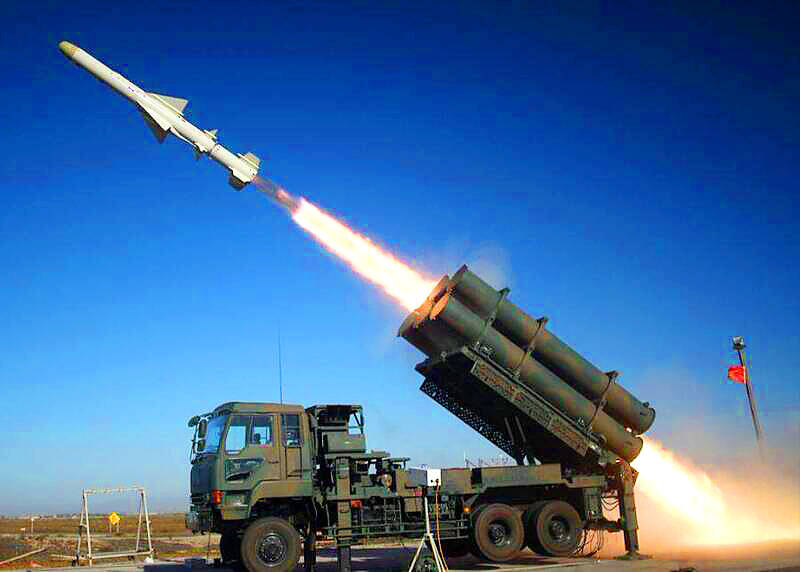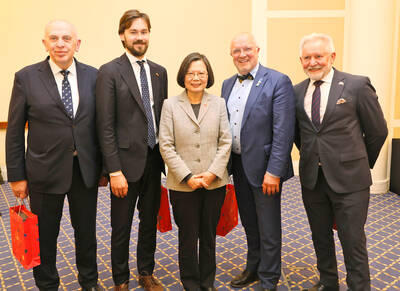Japan is obtaining anti-ship missile capabilities that could place Chinese People’s Liberation Army vessels near Taiwan under crossfire if Japan joins forces with Taiwan, a defense official said yesterday.
The comment came a day after Jiji Press reported that the Japan Ground Self-Defense Force in June is to conduct target practice exercises with land-based anti-ship missiles on Japanese soil for the first time.
Speaking on condition of anonymity, the defense official said the Type-88 and the newer Type-12 surface-to-ship missiles formed the mainstay of Japanese ground forces’ land-based anti-ship capabilities.

Photo: Screen grab from Japanese Ministry of Defense’s Web site
The older system has a range of between 120km and 150km, and the latter based on improvements to its predecessor has an effective range of more than 200km.
Japan is developing extended-range variants of the Type-12, they said.
The “phase one” variant has a planned range of 900km and “phase two” variant has a planned range of 1,200km, the official said.
Should these capabilities come online, the Japanese armed forces would be in a position to add significantly to Taiwan’s deterrence against Chinese aggression, they said.
Cape Irizaki on Yonaguni, Japan’s westernmost point, is 120km from Taiwan.
Taiwan’s principal land-based anti-ship systems are the surface-launched versions of the Hsiung Feng II, extended-range Hsiung Feng II, and Hsiung Feng III missiles.
The standard Hsiung Feng II has an engagement range of 148km.
The extended-range variant of the missile, which is known to possess advanced counter-electronic warfare measures, is estimated to be able hit targets somewhere between 160km and 200km away.
The Hsiung Feng III is said to have a 150km to 200km standard engagement range and a 250km maximum range.
The extended range variant of the Hsiung Feng III that is under development is rumored to have a striking range of up to 400km.
The land-based Harpoon anti-ship missile being procured from the US is said to have an effective range of 148km, however this figure cannot be verified with publicly available information.

Former president Tsai Ing-wen (蔡英文) on Monday called for greater cooperation between Taiwan, Lithuania and the EU to counter threats to information security, including attacks on undersea cables and other critical infrastructure. In a speech at Vilnius University in the Lithuanian capital, Tsai highlighted recent incidents in which vital undersea cables — essential for cross-border data transmission — were severed in the Taiwan Strait and the Baltic Sea over the past year. Taiwanese authorities suspect Chinese sabotage in the incidents near Taiwan’s waters, while EU leaders have said Russia is the likely culprit behind similar breaches in the Baltic. “Taiwan and our European

The Taipei District Court sentenced babysitters Liu Tsai-hsuan (劉彩萱) and Liu Jou-lin (劉若琳) to life and 18 years in prison respectively today for causing the death of a one-year-old boy in December 2023. The Taipei District Prosecutors’ Office said that Liu Tsai-hsuan was entrusted with the care of a one-year-old boy, nicknamed Kai Kai (剴剴), in August 2023 by the Child Welfare League Foundation. From Sept. 1 to Dec. 23 that year, she and her sister Liu Jou-lin allegedly committed acts of abuse against the boy, who was rushed to the hospital with severe injuries on Dec. 24, 2023, but did not

LIKE-MINDED COUNTRIES: Despite the threats from outside, Taiwan and Lithuania thrived and developed their economies, former president Tsai Ing-wen said Former president Tsai Ing-wen (蔡英文) on Saturday thanked Lithuania for its support of Taiwan, saying that both countries are united as partners in defending democracy. Speaking at a reception organized by the Lithuania-Taiwan Parliamentary Friendship Group welcoming her on her first visit to the Baltic state, Tsai said that while she was president from 2016 to last year, many Lithuanian “friends” visited Taiwan. “And I told myself I have to be here. I am very happy that I am here, a wonderful country and wonderful people,” Tsai said. Taiwan and Lithuania are in similar situations as both are neighbors to authoritarian countries, she

Taiwanese indie band Sunset Rollercoaster and South Korean outfit Hyukoh collectively received the most nominations at this year’s Golden Melody Awards, earning a total of seven nods from the jury on Wednesday. The bands collaborated on their 2024 album AAA, which received nominations for best band, best album producer, best album design and best vocal album recording. “Young Man,” a single from the album, earned nominations for song of the year and best music video, while another track, “Antenna,” also received a best music video nomination. Late Hong Kong-American singer Khalil Fong (方大同) was named the jury award winner for his 2024 album